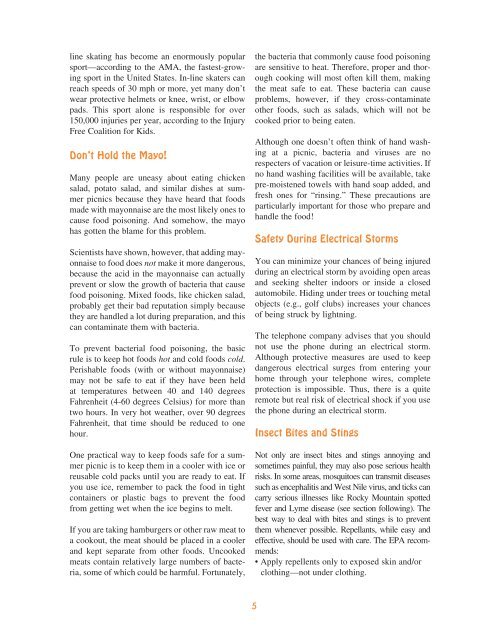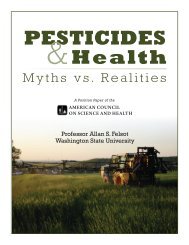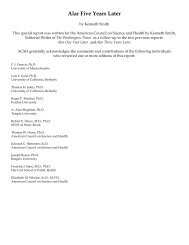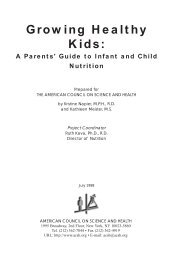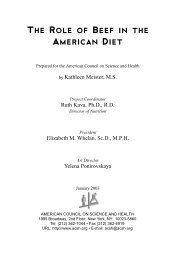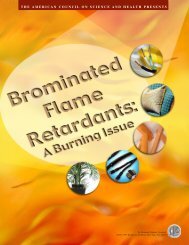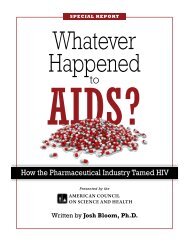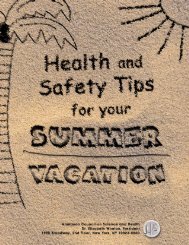Health and Safety Tips for Your Summer Vacation (Update 2010)
Health and Safety Tips for Your Summer Vacation (Update 2010)
Health and Safety Tips for Your Summer Vacation (Update 2010)
Create successful ePaper yourself
Turn your PDF publications into a flip-book with our unique Google optimized e-Paper software.
line skating has become an enormously popular<br />
sport—according to the AMA, the fastest-growing<br />
sport in the United States. In-line skaters can<br />
reach speeds of 30 mph or more, yet many don’t<br />
wear protective helmets or knee, wrist, or elbow<br />
pads. This sport alone is responsible <strong>for</strong> over<br />
150,000 injuries per year, according to the Injury<br />
Free Coalition <strong>for</strong> Kids.<br />
Don’t Hold the Mayo!<br />
Many people are uneasy about eating chicken<br />
salad, potato salad, <strong>and</strong> similar dishes at summer<br />
picnics because they have heard that foods<br />
made with mayonnaise are the most likely ones to<br />
cause food poisoning. And somehow, the mayo<br />
has gotten the blame <strong>for</strong> this problem.<br />
Scientists have shown, however, that adding mayonnaise<br />
to food does not make it more dangerous,<br />
because the acid in the mayonnaise can actually<br />
prevent or slow the growth of bacteria that cause<br />
food poisoning. Mixed foods, like chicken salad,<br />
probably get their bad reputation simply because<br />
they are h<strong>and</strong>led a lot during preparation, <strong>and</strong> this<br />
can contaminate them with bacteria.<br />
To prevent bacterial food poisoning, the basic<br />
rule is to keep hot foods hot <strong>and</strong> cold foods cold.<br />
Perishable foods (with or without mayonnaise)<br />
may not be safe to eat if they have been held<br />
at temperatures between 40 <strong>and</strong> 140 degrees<br />
Fahrenheit (4-60 degrees Celsius) <strong>for</strong> more than<br />
two hours. In very hot weather, over 90 degrees<br />
Fahrenheit, that time should be reduced to one<br />
hour.<br />
One practical way to keep foods safe <strong>for</strong> a summer<br />
picnic is to keep them in a cooler with ice or<br />
reusable cold packs until you are ready to eat. If<br />
you use ice, remember to pack the food in tight<br />
containers or plastic bags to prevent the food<br />
from getting wet when the ice begins to melt.<br />
If you are taking hamburgers or other raw meat to<br />
a cookout, the meat should be placed in a cooler<br />
<strong>and</strong> kept separate from other foods. Uncooked<br />
meats contain relatively large numbers of bacteria,<br />
some of which could be harmful. Fortunately,<br />
the bacteria that commonly cause food poisoning<br />
are sensitive to heat. There<strong>for</strong>e, proper <strong>and</strong> thorough<br />
cooking will most often kill them, making<br />
the meat safe to eat. These bacteria can cause<br />
problems, however, if they cross-contaminate<br />
other foods, such as salads, which will not be<br />
cooked prior to being eaten.<br />
Although one doesn’t often think of h<strong>and</strong> washing<br />
at a picnic, bacteria <strong>and</strong> viruses are no<br />
respecters of vacation or leisure-time activities. If<br />
no h<strong>and</strong> washing facilities will be available, take<br />
pre-moistened towels with h<strong>and</strong> soap added, <strong>and</strong><br />
fresh ones <strong>for</strong> “rinsing.” These precautions are<br />
particularly important <strong>for</strong> those who prepare <strong>and</strong><br />
h<strong>and</strong>le the food!<br />
<strong>Safety</strong> During Electrical Storms<br />
You can minimize your chances of being injured<br />
during an electrical storm by avoiding open areas<br />
<strong>and</strong> seeking shelter indoors or inside a closed<br />
automobile. Hiding under trees or touching metal<br />
objects (e.g., golf clubs) increases your chances<br />
of being struck by lightning.<br />
The telephone company advises that you should<br />
not use the phone during an electrical storm.<br />
Although protective measures are used to keep<br />
dangerous electrical surges from entering your<br />
home through your telephone wires, complete<br />
protection is impossible. Thus, there is a quite<br />
remote but real risk of electrical shock if you use<br />
the phone during an electrical storm.<br />
Insect Bites <strong>and</strong> Stings<br />
Not only are insect bites <strong>and</strong> stings annoying <strong>and</strong><br />
sometimes painful, they may also pose serious health<br />
risks. In some areas, mosquitoes can transmit diseases<br />
such as encephalitis <strong>and</strong> West Nile virus, <strong>and</strong> ticks can<br />
carry serious illnesses like Rocky Mountain spotted<br />
fever <strong>and</strong> Lyme disease (see section following). The<br />
best way to deal with bites <strong>and</strong> stings is to prevent<br />
them whenever possible. Repellants, while easy <strong>and</strong><br />
effective, should be used with care. The EPA recommends:<br />
• Apply repellents only to exposed skin <strong>and</strong>/or<br />
clothing—not under clothing.<br />
5


